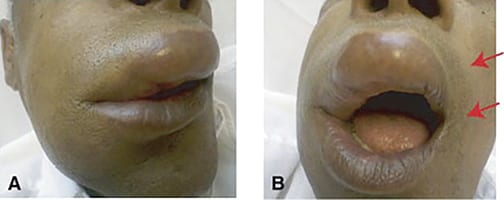By Viola Davis
I recently forced my mother to seek medical help due to her allergic reaction to a source we could not identify. My mother approached me with an ice pack on her face and lip claiming that she had either bit her lip and/or had an insect bite. I noticed that she had massive swelling of her lip and knew that something was wrong. However, within 24 hours, the swelling had spread to include her lower face. By this time, I refused any further excuses and demanded we go to the doctor and I’m glad we did.
The doctor took one look at my mother’s face and reviewed her medications and said that she was having an allergic reaction to her medications. My mother was taking angiotensin-converting enzyme (ACE) inhibitors which include drugs such as lisinopril, enalapril, captopril, and fosinopril. More than 40 million people take these drugs to treat heart failure or hypertension, especially after myocardial infarction. These drugs are also given for coronary artery disease, diabetes mellitus, chronic renal disease, or recurrent stroke.

The most common adverse reactions to ACE inhibitors are a cough, hypertension, and dizziness. My mother’s primary doctor explained that the adverse reaction she experienced to her medication is called angioedema. This is localized skin swelling resulting from the release of inflammatory mediators. Apparently, African-Americans are at greater risk of experiencing angioedema (swelling). Angioedema can develop over minutes to hours, and typically resolves in 1 to 2 days with treatment. It can also be life-threatening, especially if it goes unrecognized and untreated.
The doctor we visited for this emergency was my mother’s primary doctor and she changed my mother’s hypertensive meds and ordered medication to treat the allergic reaction.
The doctor went over some of the most common signs and symptoms of angioedema to include shortness of breath, lip and tongue swelling, and laryngeal edema. In more severe cases, patients had swelling of the lips, tongue, posterior pharynx, and eyes. The doctor warned that this reaction is known to cause swelling so bad that a person is unable to breathe. The true danger happens when people simply write the reaction off as an allergy to food, drugs, latex, and insect stings or bites. These reasons delay treatment from the healthcare provider.
If you suspect angioedema, obtain a thorough medical history (including medication history). Be sure to document a description of the edema and its pattern, noting its first appearance and associated signs and symptoms such as shortness of breath, lip and tongue swelling, etc. ACE inhibitor-related angioedema (swelling) usually arises shortly after drug therapy begins, but in some cases, it’s delayed for months or even years. To tell the truth, my mother had taken this medication for years without any reactions.
After this experience, I decided to write this article and warn the people. I scheduled an appointment with my doctor to change my blood pressure medication because I have many of the same allergies as my mother. I was also on an ACE-inhibitor.
Viola Davis is a critical care nurse with over 20+ years’ experience. She and her mother are founders of Unhappy Taxpayer and Voter. She is also State Representative-Elect for House District 87.


![Validate my RSS feed [Valid RSS]](https://web.archive.org/web/20240108205913im_/https://ocgnews.com/wp-content/uploads/2022/07/valid-rss-rogers.png)


